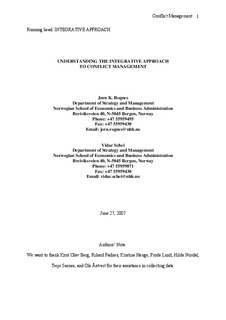Understanding the integrative approach to conflict management
Journal article, Peer reviewed
Permanent lenke
http://hdl.handle.net/11250/298182Utgivelsesdato
2010Metadata
Vis full innførselSamlinger
- Articles (SOL) [143]
Originalversjon
Journal of Managerial Psychology 2010, 25(1):82-97 http://dx.doi.org/10.1108/02683941011013885Sammendrag
Purpose
– Integration is an active search for information about facts and interests – motivated by a willingness to find mutually satisfactory agreements – and is usually necessary for creating high quality settlements in conflicts. The purpose of this paper is to examine the integrative approach to conflicts.
Design/methodology/approach
– Surveys, scenario studies, and experiments were used to explore factors relating to an integrative approach. First, how integration affected various outcome qualities (Study 1 and Study 2) was examined. Then Studies 3, 4 and 5, respectively, examined how integration was influenced by demographic (gender and education), individual (achievement motivation, creativity, and cognitive style), and relational (quality of the relationship) factors.
Findings
– Results demonstrated that an integrative approach is beneficial for various outcome‐dimensions (quality, satisfaction, fairness, and trust). Regarding predictors of an integrative approach, being male business students are negatively related to integration, while having high achievement motivation and a good relationship are positively related.
Research limitations/implications
– The correlational design in some of the studies make conclusions about causality questionable, and future research should examine the dynamic conflict process in more detail.
Practical implications
– It is helpful to know that taking an integrative approach favours all types of outcomes in conflict management processes, and that high achievement motivation and a good relationship stimulate an integrative approach.
Originality/value
– The paper shows how different variables relate to an integrative approach and offers insight to those involved in conflict management processes.
Beskrivelse
-This is the author's version of the article: "Understanding the integrative approach to conflict management" Journal of Managerial Psychology , Volume 25, Issue 1
